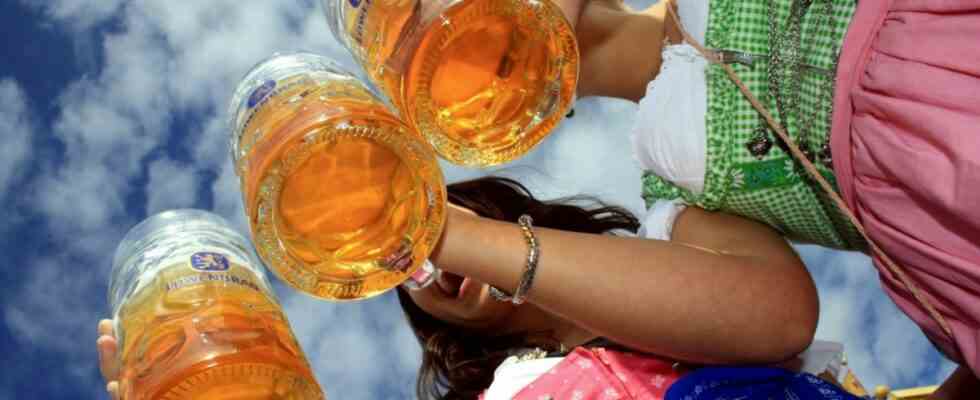According to official information, 7.3 million liters of beer were drunk by the visitors at the last Oktoberfest in 2019. After a two-year pandemic break, the Wiesn is to take place again this year from Saturday, September 17th to Monday, October 3rd, on the Theresienwiese in Munich. Then the (celebration) thirsty visitors can look forward to a full beer again – if the Oktoberfest really takes place. Because parallel to the increasing corona numbers in Germany, the fear of a cancellation that is still possible is also growing. But the erection of the tents is already in full swing.
There are 38 of them at the Wiesn. These include the 14 large festival halls with up to 10,000 seats and standing room, whose names such as Bräurosl, Fischer-Vroni and Schottenhamel should be well known throughout Germany. There are also 21 small tents that can accommodate between 100 and 1000 Oktoberfest visitors, as well as three tents on the Oidn Wiesn with space for 1800 to 5300 people. A total of six Munich breweries supply almost all tents. Excluded are the café tents and the wine tent, which do not offer Oktoberfest beer.
Augustiner, Hacker-Pschorr, Hofbräu, Löwenbräu, Paulaner and Spaten are the names of the breweries that have the privilege of brewing beer for the Wiesn. The prerequisite is the use of water from the Munich city area. And although most visitors to the Oktoberfest are just happy if they even made it into one of the tents, some people have their own special preferences when it comes to the type of beer. An overview of which beer brand can be found in which tent:
Augustiner: The oldest brewery in Munich
In 1328, Augustinian monks founded the brewery, which is now based on Landsberger Straße. It is considered to be the oldest brewery still in existence within the Munich city limits. The six percent Wiesn beer, which is the only one still stored in the traditional 200-liter wooden barrels, is served a total of seven times, except in the large tents Augustiner-Festhalle and Fischer-Vroni in the festival tent Tradition and in the new tent Schützenliesl by Lorenz Stiftl the Oidn Wiesn. From the smaller tents, Augustiner supplies the Ammer chicken and duck roastery, the Wildstuben and the Zur Bratwurst marquee.
A little insider tip for all bargain hunters: In the Augustiner Festhalle there is the Wiesn Mass for 12.80 euros. This makes it the cheapest size in the large tents.
Hacker-Pschorr: The “weakest” of all Oktoberfest beers
The brewery, which has existed since the 15th century, was once considered the leading brewery in Munich. Split up between brothers in the meantime, Hacker and Pschorr reunited in 1972. The beer brand is best known for the traditional swing top that has been in use again since 2007.
Hacker-Pschorr’s Wiesn beer is the weakest at 5.8 percent alcohol. It flows from the tap in the large festival halls Hacker-Festzelt and Bräurosl, and the Fisch-Bäda, Heimers Enten- und Hendlbraterei and Poschners also treat their guests to Hacker-Pschorr.
Löwenbräu: The largest brewery in the city
Löwenbräu, although much older, only developed into the largest brewery in Munich in the 19th century. Well-known traditional events take place in the Löwenbräukeller all year round. At the Oktoberfest, the “Löwenbräu-Festzelt” is easily recognizable by the huge lion that decorates the festival hall, roaring and drinking beer. The Schützenfestzelt, the Haxnbraterei and the Kalbsbraterei also serve the 6.1 percent Löwen-Trunk.
Paulaner: The biggest supplier at the Wiesn
Paulaner, founded in 1634, is the youngest brewery represented at the Oktoberfest. It is also known above all for the large restaurant on the Nockherberg, where the annual strong beer festival and the famous politicians’ derblecken take place. At the Oktoberfest, the brewery holds the record for the most supplied beer tents. In addition to the Paulaner festival tent Winzerer Fähndl, these are the celebrity tent Käfer-Wiesnschenke and the Armbrustschützen tent.
In the small tents, the six percent beer flows into the Masskrug at Heinz Wurst- und Hühnerbraterei, the Metzgerstubn, the Münchner Knödelei, the new Münchner Stubn tent and in the Paulaner Weißbiergarten. In addition, the Kuffler Weinzelt serves Paulaner wheat beer until 9 p.m.
Spaten: The beer for the traditional tapping
Spaten was the first brewery to bring the world-famous “Münchner Hell” onto the market in 1894. The brewery, which was founded in 1397, is also given another honor: with its 5.9 percent Wiesn beer, it supplies the Schottenhamel Festival Hall, among others, where the Mayor of Munich says the famous words “O ‘zapft is’ the Wiesn opens. The large Marstall and Ochsenbraterei tents also serve Spaten beer. The smaller tents are the Glöckle Wirt, the Goldener Hahn and the Wirtshaus zum Schichtl.
State Hofbräuhaus: The “strongest” beer is only available in a tent
The Munich Hofbräuhaus is one of the main tourist attractions in the city and is famous far beyond the borders of Germany. The brewery was founded in 1589 and has been a state enterprise since 1939. With an alcohol content of 6.3 percent, Hofbräu delivers the strongest Wiesn beer. But you can only drink it in a single tent: the Hofbräu tent. With almost 10,000 indoor and outdoor places, this is the tent with the largest total capacity.
There is no Wiesn beer in these tents
Anyone who, despite all the tradition and selection, can’t do anything with beer at the Oktoberfest doesn’t have to go home thirsty. The Kuffler Weinzelt and the Feisinger Kas- und Weinstuben offer other high-revolution alternatives in addition to wheat beer from Paulaner and Franziskaner. You will look in vain for Wiesn beer here or in the four café tents. As the name suggests, these focus on coffee and desserts. A small selection of sparkling wine and wine is also on the menu there. All Wiesn tents also sell non-alcoholic soft drinks and water.

